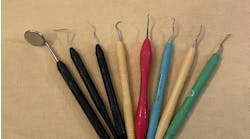Assistant and doctor point-counterpoint with Mark Hyman, DDS, and Tina Calloway, CDA
Sept. 17, 2009
Question: I have recently relocated to a new town and was fortunate to find employment in an office where I believe I will be very happy. My new dentist recently purchased the practice from a retiring dentist, and just finished making extensive renovations. He is truly motivated to develop a top performing dental team. I am just a few years into my dental assisting career; however, my first practice was among one of the top dental teams in the country. My new dentist sees this experience as an opportunity and has asked me to share my knowledge to help this new practice become highly profitable. Our region has been particularly affected by the downturn in the economy, and we are finding that our patients are not willing to proceed with treatments that will benefit them long term and are seeking less expensive short-term solutions, such as extractions vs. crowns. Our dentist has ordered intraoral cameras to help us show patients their problems in real time on video, but until then, how can we help our practice grow without this vital tool? Signed, Hopeful for helpAssistant point: Dear Hopeful, I am very glad that you have found a happy dental home. It is not always easy moving from a thriving practice to one that has not yet realized its full potential. It sounds as though you are making a valiant effort to help your team become successful. In today’s economy it is a struggle for families to think long term for their oral care, especially when they do not understand the value of dental health, or would rather deal with problems later and “get that tooth patched up for now.” Being the new kid on the block, you will need to earn the trust of the practice’s current patients. When patients trust you, they see you as their advocate in attaining oral health. To achieve this role, you can start by asking patients to define their goals for their oral health. You may find that this is something they have not even thought about yet. Use your listening skills to understand what they are telling you. Sometimes we think too much about what we are going to say next as clinical caregivers and miss the nonverbal messages our patients are sending us. Once you have established your patient’s goals, the next question would be, “How can I help you to achieve these?” When they have given you some insight on how they would like to be helped, you can use that to move forward and discuss the treatment the dentist recommended. Remember, in your past office you had the convenience of using one of the best tools available, the intraoral camera. This helps patients take ownership of their issue, because after all, seeing is believing! In your case, you may have to use word pictures for patients who are visual learners. For example, compare the foundation of a tooth with a cavity to a house infested with termites. You will need the exterminator to remove the termites in order to get the house back to a healthy structure. The return to strength is similar to what happens to a tooth after the dentist has treated it for decay. Also, be sure to tell patients about the financial options your office has available and help them to understand that the return on an investment in good oral health far outweighs the short-term benefit of “patching it up.”Doctor counterpoint: Dear Hopeful, helping a patient understand the value of good oral health is an ongoing process. We build this awareness over time by using effective educational tools like the intraoral camera, the CAESY video education system, and DIAGNOdent. Please keep in mind that when a patient says “no”, this can actually mean “not yet”. Stressing flexible financing programs such as CareCredit can help patients pay for the care they are seeking with a comfortable payment schedule. Holding morning huddles with your team to identify and share small opportunities for the day will increase your daily productivity. Keys to success also include team education and training, perhaps in a “lunch and learn” venue, and a commitment by everyone in the practice to achieving excellence in verbal communication. Question: Dear Tina, I enjoyed reading your article “Keeping the Flame Alive.” I listened to Dr. Hyman’s lecture which was also very inspiring. Perhaps you can provide some insight to me. I have been a dental assistant for nine years. I really love what I do, and my patients are wonderful. However, over the past three years things have changed — it’s been like walking on eggshells. Our doctor is different and does not seem as passionate as he used to be, and frankly, he looks burned out. He is quick to get upset. We have all noticed his attitude, but we don’t know how to help him. We are afraid to tell him that we are concerned about these changes. I am getting frustrated, but I love what I do and do not want his negativity to bring us all down. You can cut the atmosphere with a scalpel! I am really looking forward to vacation soon — much more than usual — and I have thought of changing careers. What can I do to improve this situation? Signed, Seriously confused and on the brink of miseryAssistant point: Dear Seriously confused, you are in a tough situation, but it is not unique. It sounds like YOU know that you love your career in clinical assisting. That is the good news in your letter. If you told me you were burned out on assisting, then I would be worried. So let’s look at your dentist’s problem. It’s not easy owning your own business and trying to be all things to all people. I experienced a similar scenario years ago when our dentist told us, “Ladies, I am barely holding my head above water.” With this statement, he left the room. I wasn’t sure what to do with this depressing information, and it eventually motivated me to make the move to another office. If I could go back in time, I would ask, “Doctor, what can we do to help?” You and your team should let your dentist know that you have noticed a change and that you care about him as an individual. Perhaps he just may need someone to listen, or maybe he is not ready to share yet. You are correct in saying that it is not easy to approach people we care about, but what would be the cost if you didn’t vs. the benefit of working through a solution together?Doctor counterpoint: Dear Confused, in my experience, it is a wonderful and profound thing for a team to acknowledge the extraordinary pressure the dentist must deal with every day — financially, emotionally, and physically. Perhaps your team would consider a consultant to advise and guide your dentist and the practice to an optimal level of satisfaction and success. Team education in clinical excellence and business/management courses can prove to be very helpful. One of the most inspiring courses that changed my practice, career, and life is the Dale Carnegie program. I’ve taken many continuing-education courses over the years that have motivated me greatly, and one of the reasons I became a national speaker is to help other dentists reclaim their passion for their careers. Another suggestion would be for the team to commit to helping the dentist take the practice to a higher level. At least once a year our practice will pick an offsite “renewal” location and go there for a day to brainstorm, strategize, and create action steps to increase the success of the practice while enriching the work experience of each team member. For any dentist, the team’s daily commitment to the practice’s ongoing strength and success is a priceless gift.If you would like to contribute any questions to be answered by Dr. Hyman and Tina, please e-mail [email protected]. Two questions will be selected and posted in your next issue of DAD.





